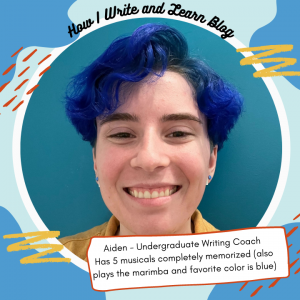In this blog series, “Ask a Coach!” our Writing and Learning Center coaches answer our UNC-CH undergrads’ burning questions! Check back every month to see what our coaches have to say about everything from taking breaks to utilizing office hours!
How can I stay focused during longer studying sessions, especially when I have a due date coming up soon?
 Aiden: Take breaks! Think of it like rounds of sprinting, rather than a sustained marathon. Sometimes I ‘get in the zone’ and whip out an essay pretty quickly, but when it’s something more related to comprehension (like examining different theorists) or memorization (like learning new language vocabulary), I like to think of the content I need to go over in chunks. Also, it’s important for me to check in with myself throughout my study session. If I just spent ten minutes reading through my notes but couldn’t explain them to another person, I probably need to take a break as I am simply exposing myself to content rather than actively engaging with it. When I have a due date coming up soon, I try and get started as soon as possible, even if it’s just a little section like the thesis of a paper or the material in the first section of a chapter. This makes my studying feel less overwhelming, and shows me that breaking it down makes the task more manageable.
Aiden: Take breaks! Think of it like rounds of sprinting, rather than a sustained marathon. Sometimes I ‘get in the zone’ and whip out an essay pretty quickly, but when it’s something more related to comprehension (like examining different theorists) or memorization (like learning new language vocabulary), I like to think of the content I need to go over in chunks. Also, it’s important for me to check in with myself throughout my study session. If I just spent ten minutes reading through my notes but couldn’t explain them to another person, I probably need to take a break as I am simply exposing myself to content rather than actively engaging with it. When I have a due date coming up soon, I try and get started as soon as possible, even if it’s just a little section like the thesis of a paper or the material in the first section of a chapter. This makes my studying feel less overwhelming, and shows me that breaking it down makes the task more manageable.
 Miranda: It sounds silly, but know your body. Often when we study for long time periods, our mind wanders or gets foggy (usually we are taking in too much information at once) and we get restless. I have found that finding a really great study spot can help. Making sure I have my supplies (water and food). And taking small breaks to walk around (not getting on the cell phone or zoning out online). Making sure the body and mind can stay focused is a huge part of long periods of work. At the same time, knowing when and how to take breaks really helps too!
Miranda: It sounds silly, but know your body. Often when we study for long time periods, our mind wanders or gets foggy (usually we are taking in too much information at once) and we get restless. I have found that finding a really great study spot can help. Making sure I have my supplies (water and food). And taking small breaks to walk around (not getting on the cell phone or zoning out online). Making sure the body and mind can stay focused is a huge part of long periods of work. At the same time, knowing when and how to take breaks really helps too!
 Michael: There are just some days when things don’t click, it’s impossible to get started and even when I do my focus seems to last five minutes at most. I’d get anxious that work wasn’t getting done and the spiral continued. By evening, I’d lie in bed stressed because nothing got done and another day was wasted. Eventually, I learned to just stop. I’d put my laptop away and just go do something else: hangout in the lounge, read a book, play basketball, whatever. While that day may have been a wash, I found that after a good night of sleep and a day to refresh, what seemed impossible less than a day before became so much easier. Sometimes you’ll have to power through, but if you start working early and have an extra couple days to spare, it might be worth it to step away from work for a day and so that you can return to work in a better state. Better motivation and emotional balance can play just as important a role as a couple hours of studying in academic success. Finding that balance is tricky, but listen to your body and mind and you’ll hopefully find something that works for you!
Michael: There are just some days when things don’t click, it’s impossible to get started and even when I do my focus seems to last five minutes at most. I’d get anxious that work wasn’t getting done and the spiral continued. By evening, I’d lie in bed stressed because nothing got done and another day was wasted. Eventually, I learned to just stop. I’d put my laptop away and just go do something else: hangout in the lounge, read a book, play basketball, whatever. While that day may have been a wash, I found that after a good night of sleep and a day to refresh, what seemed impossible less than a day before became so much easier. Sometimes you’ll have to power through, but if you start working early and have an extra couple days to spare, it might be worth it to step away from work for a day and so that you can return to work in a better state. Better motivation and emotional balance can play just as important a role as a couple hours of studying in academic success. Finding that balance is tricky, but listen to your body and mind and you’ll hopefully find something that works for you!
 Yi-Hsuan: This sounds off, but try to avoid it! Our brains are not built to allow you to focus for a long block of time. My average is about 1.5 to 2 hours with short breaks in-between (about 3 to 4 pomodoros), then I need a longer break to come back. Usually around 1 to 1.5 hour. Knowing that should help you to arrange your calendar and get started earlier. Even if you only have 1 day left to finish the assignment, try to spread it out across the day, do 2 hours in the morning and then 2 hours in the evening. Of course, we would all come down to a time where there is a close deadline when all these arrangements seem impossible. In that case, try to distinguish energy-demanding tasks from easy tasks, and use a combination of them to allow your brain to take breaks. For example, if you’re writing a paper, coming up with new sentences should be very energy-consuming, while adding citations, page numbers, and formatting are much easier. Try to switch between them within the pomodoro framework, for example, write for 30 minutes and do 30 minutes citations. It would allow your brain to take a break from the heavy task and be refreshed when you come back.
Yi-Hsuan: This sounds off, but try to avoid it! Our brains are not built to allow you to focus for a long block of time. My average is about 1.5 to 2 hours with short breaks in-between (about 3 to 4 pomodoros), then I need a longer break to come back. Usually around 1 to 1.5 hour. Knowing that should help you to arrange your calendar and get started earlier. Even if you only have 1 day left to finish the assignment, try to spread it out across the day, do 2 hours in the morning and then 2 hours in the evening. Of course, we would all come down to a time where there is a close deadline when all these arrangements seem impossible. In that case, try to distinguish energy-demanding tasks from easy tasks, and use a combination of them to allow your brain to take breaks. For example, if you’re writing a paper, coming up with new sentences should be very energy-consuming, while adding citations, page numbers, and formatting are much easier. Try to switch between them within the pomodoro framework, for example, write for 30 minutes and do 30 minutes citations. It would allow your brain to take a break from the heavy task and be refreshed when you come back.
This blog showcases the perspectives of UNC Chapel Hill community members learning and writing online. If you want to talk to a Writing and Learning Center coach about implementing strategies described in the blog, make an appointment with a writing coach, a peer tutor, or an academic coach today. Have an idea for a blog post about how you are learning and writing remotely? Contact us here.

